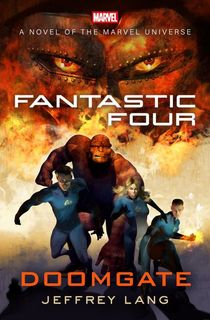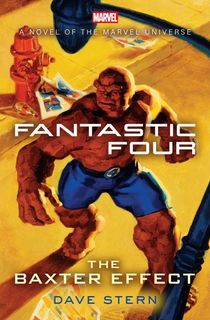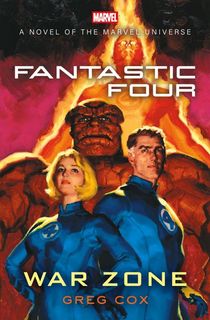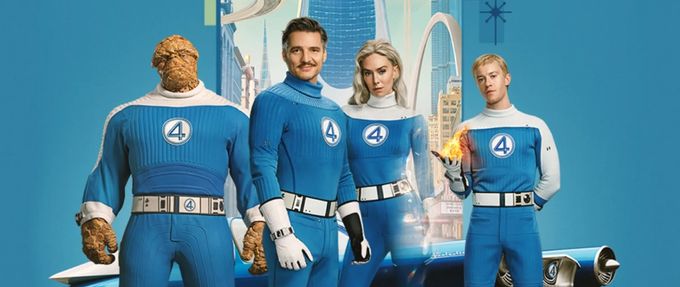The Fantastic Four has never been one of my favorite franchises, be it comics, cartoons (Hanna-Barbera or otherwise), or either of the previous attempts at a film adaptation.
The team debuted in comics in the early 60s and encompassed an overly earnest goofiness of the time that I always felt other iterations failed to leave behind. This was an anachronistic silliness that, to me, never felt like a graspable truth in the 21st century.
With The Fantastic Four: First Steps, I have never been happier to be wrong. This film was not only an incredible superhero movie, but an incredible movie, full stop. It exhibited a love and care for the source material, so much so that it has inspired me to revisit the comics.
The 2005 film adaptation was made before film studios and audiences alike tipped all the way into the superhero craze. It also feels very of its time, and while I don’t recall particularly enjoying the film when I was 12, it holds up even less today.
It felt like it didn’t know if it should be for children or for adults, and failed to toe the line between the two in a way that really made it appeal to no one. Looking back, it almost looks like a satire of the genre. The powers were cheesy, the plot was dismissible, and the characters were one-note caricatures.
Ten years later, the attempt to reboot the franchise in film was, to say the least, a little embarrassing. The decision to modernize the material by giving it an edgy makeover fell immediately flat.
Even a superstar cast couldn’t save the movie, which most people just pretend doesn’t exist. Otherwise, it’s been reduced to meme fodder.
When I went to the theater to watch the new film, I was expecting to be vaguely satisfied with a run-of-the-mill big budget Marvel movie. I wasn’t expecting to leave feeling like it was the best project Marvel has put out in years—and perhaps ever.
Previously, my favorite Marvel project had been the WandaVision series, so maybe I shouldn’t have been surprised that Matt Shakman, the director of all nine episodes of the series and the director of the latest Fantastic Four movie, delivered another near-perfect addition to the MCU. Like WandaVision, The Fantastic Four had a deep empathy pulsing through the characters and their story. This empathy had me enraptured, tuned in to every choice and every emotional beat.
The characters in this film were more fully realized than I’ve seen before on a big screen. Each of the heroes felt incredibly human and tangible. They had fears and anxieties written clear as day into their motives, and though they performed for the public, they still dug deep into real moments of vulnerability. Not a single one of them were perfect, but they all got to define how they got to be strong in moments of both global and personal crisis.
No one will be surprised to hear that Pedro Pascal delivered a remarkable performance as Reed Richards. He played the character with a quiet intimacy, at times wielding his arrogant genius as his fatal flaw, and doing so with a heartbreaking precision. Thankfully, his powers were very well-rendered, and not over-used in the film, so as not to be taken as a joke or take on the all too easy cringe factor that comes with stretch powers. It was always made clear that, despite the change in his genetics, his power was his brain.

Fantastic Four: Doomgate
For all that Joseph Quinn is one of my favorite actors, I’ll admit that I was nervous about him taking on the role of Johnny Storm. Clearly I was stupid to worry, as he was a natural standout in the film. Maintaining the cockiness that Johnny is known for, Quinn captured a yearning ambition that rounded out the character. While frequently bringing levity to suffocatingly tense situations, he also had a softness and love for his family that made him irresistibly endearing.
I’m not personally familiar with Vanessa Kirby’s past work, but she was the absolute shining star of this film—which is truly saying something, considering her talented costars. There’s always a delicate balance for women in superhero movies (and let’s be honest, all other movies, too). However, not once did Sue Storm feel like she was nothing more than “Mister Fantastic’s Wife,” nor did she feel like a character that was forced to uphold the whole of feminism upon her back. She was not made interesting and relatable through unspeakable tragedy. She was honestly just cool as hell.
Sue Storm was the heart of this film, through and through. Oftentimes, she was the strength, too. Portrayed as both a diplomatic wonder and a fiercely loving mother, she also got to shine with her powers. It didn’t feel like heavy-handed “See, women can have it all—and they have to be everything” rhetoric (Though I'll admit to loving these cheeseball depictions too, it was nice to see that's not all cinema has to offer anymore).
Sue's depiction felt like an acknowledgement of the unique quiet power so many women possess that goes so often unnoticed. It was a showcase of how mothers hold families and communities together.
My biggest complaint of the film would be that Ebon Moss-Bachrach’s Ben Grimm was greatly sidelined in the story. He brought a solidity (pun not intended) to the team that felt really vital, and while the tragedy of his transformation was alluded to, it wasn’t given much time. Though I appreciate seeing a healed Grimm who’s a bit more comfortable in his skin, I would have liked to have seen him have a bit more hands-on contributions in the story.
Julia Garner’s Silver Surfer was at once chillingly ominous and achingly sympathetic. Ralph Ineson’s Galactus had all of the proper gravitas, though he probably had a total of two minutes of screen time. And honestly, they found the cutest baby in the world to play Franklin Richards, I was enchanted from second one.
Besides the wonderful cast and characters, the film’s biggest strength was its aesthetic and atmosphere. Set on Earth 828, an alternate universe from the main MCU, the film immediately felt like a different, unique place.
The world-building didn’t come just from the retro-futuristic approach—though this decision greatly helped mitigate the cheese factor, making the goofy aspects of the franchise feel natural and charming. There was an extra spark in this film, a pulse of hope that took on a life of its own.

Fantastic Four: The Baxter Effect
It seems as though the MCU as a whole has been getting darker and darker. Marvel films have shown the darkest depths of human atrocities, and have even shown the darker sides of some of the world’s heroes. At times, the grief and loss in these movies have felt insurmountable. It’s felt like there are problems that not even anomalous powered beings can tackle.
The Fantastic Four: First Steps offers a brighter perspective. It shows a world that, while not perfect, will stand together to see another day. It shows a world capable of change and growth.
It’s not a world without suffering or hardship, but a world willing to find a solution. And while there’s no denying the Fantastic Four are unprecedented minds and physical wonders, their humanity also makes progress feel accessible.
A movie like this was a breath of fresh air. I felt a temporary relief from the outside world, which is stressful enough without having to think maybe even superheroes can’t save it. It’s exactly the kind of movie audiences need right now.
The movie excelled for stepping around the origin story, making the characters and the world feel seasoned and well lived-in. The FX were incredible, leaving me second guessing at several points if they used practical FX over CGI. The stakes felt higher and more palpable than ever, keeping my eyes glued to the screen.
I laughed, I cried, I squirmed on the edge of my seat.
The mid-credits scene made several people gasp, while honestly the post-credits scene is not worth sticking around for, die-hard fan or not.
I would give The Fantastic Four: First Steps a 9.5/10, and all of my fingers are crossed that this heralds in a new era of superhero movies.

